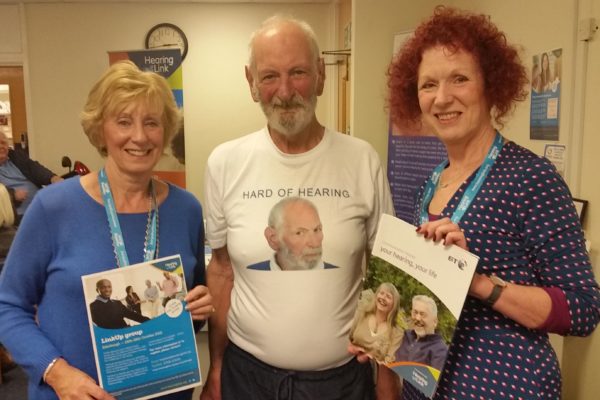Blog: Helping to support Edinburgh audiology patients

By Margaret Canning, Hearing Link volunteer
Last year, Hearing Link started to offer drop-in sessions for hearing loss as part of it Hearing Aid Liaison Outreach project – or HALO as it’s better known to us!
The project, funded by the Edinburgh Health and Social Care Partnership and See Hear Fund Scotland, was created to support people with hearing loss and their family and friends by offering emotional and practical information and advice.
Held every 1st and 3rd Friday of the month at the Adult Audiology Department at Lauriston Place it is a chance for someone, unsure of the next steps to take, to talk to one of our volunteers while they wait for their appointment. Patients who aren’t attending for an appointment that day can also drop-in if they are looking for information and support.
I was delighted to take part in the first session along with a fellow volunteer Debbie Innes and accompanied by Lorna Armstrong, Scotland Director for Hearing Link.
The volunteers that attend all our drop-in sessions have hearing loss themselves, so know only too well how difficult life can be living with these challenges daily. We also have a few hearing volunteers that are involved too, who understand hearing loss either through their profession or through a relative or friend.
The aim of each chat is to find out if we can help by way of practical or emotional support. We do this on a one-to-one basis to find out what their needs may be.
It is good to find out how people are coping. Quite a few have mild hearing loss and don’t need our help at this time but are happy to hear how Hearing Link may be able to support them in the future.
We find that many people say that they are coping just fine, even those with moderate-to-severe hearing loss. However, when asked different questions we often find that many of them are struggling on a daily basis, don’t have access to assistive listening devices and are not sure where to find them.
Some of the people we speak also need emotional support and once they start chatting to us they realise we can help in this way. We can continue our discussions in a private room within the clinic, or we may suggest a visit from one of our Community Support Volunteers.
We tell them about our LinkUp groups which are also for partners, family and friends, and our Helpdesk where our experienced volunteers offer personalised support and information.
We spend anything from five minutes to 30 minutes with each person, depending how long they can have before their appointment – of course they are always welcome to come back to us afterwards.
The subject matter or information we chat about is very varied. It could be they need information about access to assistive listening equipment such as a doorbell or help to hear the TV better, and guide them through the best way to access this equipment.
We advise about getting out and about, going to the theatre and cinema which a lot of people with hearing loss just don’t do anymore. Or we simply chat in general about their lives with hearing loss.
We have access to lots of booklets and leaflets from different organisations that they can take away with them. We also direct them to the Edinburgh Hearing Loss Directory which has a huge knowledge base of local services for people with hearing loss.
It is such a worthwhile and enjoyable project for me and the rest of the HALO team to be involved in. We feel we make such a difference, especially when someone is struggling with their hearing loss and they appreciate that we are there to offer our help in whatever way they need.
Our drop-in sessions take place from 1.30pm-4pm on the 1st and 3rd of each month. Please drop in and see us, no appointments are required.
Also, if you are interested in volunteering as part of this project, please email scotland@hearinglink.org.
(Picture: Margaret is pictured with Ann Thallon, volunteer, and former beneficiary Bill Carle)